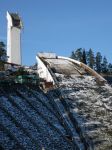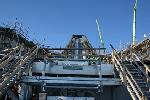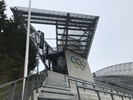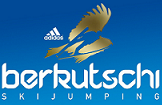Recent news:
4000th facility has been added to the Ski Jumping Hill Archive
7000th ski jumping hill added to the Archive!
New Granåsen ski jump in Trondheim inaugurated
Fire destroys ski jumps in Biberau-Biberschlag
Copper Peak: Funding of the renovation finally secured
Send us your ski jumping hill photos and information via email!
Latest updates:
2025-04-18
2025-04-17
2025-04-16
2025-04-15
2025-04-14
2025-04-13
2025-04-12
2025-04-11
Advertisement:
Partner:




 Oslo
Oslo
Holmenkollen
Data | History | Hill records | Competitions | Contact | Links | Map | Photo gallery | Articles | Comments
.
Holmenkollbakken:
Holmenkollbakken:
| Hill Size: | HS 128 |
| K-Point: | 115 m |
  Hill record: Hill record: |
136.0 m (Tommy Ingebrigtsen  , 2006-01-25, N-NOR) , 2006-01-25, N-NOR) |
  Official hill record: Official hill record: |
134.0 m (Andreas Widhölzl  , 2005-03-13, WC) , 2005-03-13, WC) |
  Hill record: Hill record: |
131.0 m (Anette Sagen  , 2006-01-25, N-NOR) , 2006-01-25, N-NOR) |
| Take-off angle: | 11.5° |
| Take-off height: | 2.92 m |
| Speed: | 93 km/h |
| Landing angle: | 34.5° |
| Conversions: | 1993, 1999 |
| Operating until: | 2008 |
Holmenkollbakken:
| K-Point: | 105 m |
  Hill record: Hill record: |
114.5 m (Steinar Solhaug  , 1993-03-07) , 1993-03-07) |
  Official hill record: Official hill record: |
111.0 m (Toni Nieminen  , 1992-03-15, WC) , 1992-03-15, WC) |
| Conversions: | 1980 |
| Operating until: | 1993 |
Holmenkollbakken:
| K-Point: | 88 m |
  Hill record: Hill record: |
99.0 m (Anton Innauer  , 1978-03-11) , 1978-03-11) |
  Official hill record: Official hill record: |
98.5 m (Thomas Meisinger  , 1977-03-13) , 1977-03-13) |
  Hill record: Hill record: |
76.0 m (Anita Wold  , 1974-03-10) , 1974-03-10) |
  Official hill record: Official hill record: |
66.5 m (Anita Wold  , 1974-03-09) , 1974-03-09) |
| Conversions: | 1962 |
| Operating until: | 1979 |
Holmenkollbakken:
| K-Point: | 65 m |
  Hill record: Hill record: |
74.0 m (Helmut Recknagel  , 1957-03-02) , 1957-03-02) |
  Official hill record: Official hill record: |
71.5 m (Otto Leodolter  , 1959-03-08) , 1959-03-08) |
| Conversions: | 1946, 1950 |
| Operating until: | 1961 |
Holmenkollbakken:
| K-Point: | 60 m |
 Longest jump: Longest jump: |
71.5 m (Arne Ulland  , 1940-03-04) , 1940-03-04) |
  Hill record: Hill record: |
68.5 m (Kolbjørn Skjæveland  , 1940-03-04) , 1940-03-04) |
| Tower height: | 40 m |
| Conversions: | 1939, 1940 |
| Operating until: | 1940 |
Holmenkollbakken:
| K-Point: | 48 m |
  Hill record: Hill record: |
60.0 m (Reidar Andersen  , 1938-03-10) , 1938-03-10) |
  Official hill record: Official hill record: |
54.5 m (Trygve Gundersen  , 1938-03-06) , 1938-03-06) |
| Tower height: | 19 m |
| Conversions: | 1928 |
| Operating until: | 1938 |
Holmenkollbakken:
| K-Point: | 40 m |
 Longest jump: Longest jump: |
47.0 m (Olav T. Kaasa  , 1922-02-27) , 1922-02-27) |
  Hill record: Hill record: |
46.0 m (Jacob Tullin Thams  , 1922-02-27) , 1922-02-27) |
| Conversions: | 1896, 1902, 1914, 1917, 1918 |
| Operating until: | 1927 |
History:
In the home country of skiing the first ski jumping competitions took place from 1879 to 1891 on Husebybakken in the western part of Oslo. On January 31, 1892 around 5 km north of it a new ski jumping hill at Holmenkollen was inaugurated. Attended by an outrageous number of 20,000 spectators the first winner jumped on 22.5 m. Since this year the traditional Holmenkollen competitions, which later became skiing festivals and now are the regular World Cup competitions in March, have been existing.
With the development of ski jumping of course the ski jump changed its outline, too and up until now it has been converted 14 times. In 1904 the takeoff which was constructed out of wood and snow, was replaced by stone construction, ten years later the first wooden inrun tower was built and stood until 1927, when it destructed only one day after a tournament. In 1928 the construction of a 19 m high new tower began, as well as the enlargement and drainage of the landing hill and outrun and then for the World championships a worthy ski jumping facility could be presented. With the 40 meters high tower, which was made by concrete in 1939, for a first time more than 60 meters could be jumped.
World War II interrupted sports business for six years and for the first competition after the war 106,000 spectators came to “Fredsrennet”, one of them king Haakon VII. When the Olympic Winter Games 1952 were opened, participants were astonished by the new inrun of the ski jump which was supported by concrete columns and had symmetrical spectator traverses on both sides. Because there have been ski jumping World Champions on large and normal hill since 1962, for the WSC 1966 Midtstubakken was built about 500 m apart. Before the WSC 1982 the whole facility was renovated again, the last larger conversion took place in 1992.
For the WSC 2011 again a renovation of the whole winter sports area was necessary and so the decision for a complete demolition and new-construction of the Holmenkollen ski jump fell after a long seesaw in April 2008. On 2008-10-17 the new-construction of the “Nye Holmenkollen Fyr” HS 134 ski jump of Copenhagen-based JDS Architects was started with the destruction of the inrun tower. In only a bit more than one year of construction time the new Holmenkollbakken had been prepared for ski jumping and so 7,000 spectators could celebrate the official inauguration with the first jump on 106.5 m made by Anette Sagen on March 3, 2010. The total cost for the modernization of the Holmenkollen facilities as a preparation for the WSC 2011 was more than 200m Euro, including Midtstubakken and cross-country facilities.
Conservation and renovation were and are a never-ending process in this arena, where by the 50,000 members counting skiing union “Foreningen til Ski-Idrettens Fremme”, shortly called Skiforeningen, plays a very important role. This is not only concerning preparation and execution of sports highlights in winter time, but also delivering and supporting the miscellaneous sports activities in summer around Holmenkollen.
Worth mentioning is also the oldest skiing museum of the world, which has been existing at Holmenkollen since 1932 and moved inside the hill in 1966. In 1983 it was reopened completely new directly inside the fundament of the ski jump and with the lift you can enjoy a wonderful overview of Oslo from the 60 m high starting platform. Over 1.2 million visitors every year are interested into the development of skiing sports and so this museum is one of main tourist spotlights on the Norwegian capitol. Paris has its Eiffel tower, New York has the statue of Liberty and Oslo has the Holmenkollen – the Mekka of winter sports.
 Hill records K120 (Men):
Hill records K120 (Men):
| K120 |  |
2025-03-16: | 146.0 m | Ilkka Herola  |
NC-WC |
| K120 |  |
2019-03-09: | 144.0 m | Robert Johansson  |
WC-T |
| K120 |  |
2011-03-05: | 141.0 m | Andreas Kofler  |
WSC-T |
| K120 |  |
2011-02-08: | 142.5 m | Anders Jacobsen  |
N-NOR |
| K120 |  |
2010-03-14: | 142.0 m | Adam Małysz  |
WC |
| K120 |  |
2010-03-14: | 139.5 m | Andreas Kofler  |
WC |
| K120 |  |
2010-03-03: | 141.0 m | Rune Velta  |
|
| K115 |  |
2006-01-25: | 136.0 m | Tommy Ingebrigtsen  |
N-NOR |
| K115 |  |
2005-03-13: | 134.0 m | Andreas Widhölzl  |
WC |
| K115 |  |
2000-03-12: | 132.5 m | Sven Hannawald  |
WC |
| K115 |  |
1999: | 131.0 m | Olav Magne Dønnem  |
|
| K115 |  |
1998-03-15: | 125.5 m | Primož Peterka  |
WC |
| K115 |  |
1997-03-16: | 125.5 m | Kazuyoshi Funaki  |
WC |
| K115 |  |
1997-03-15: | 127.0 m | Håvard Lie  |
WC |
| K115 |  |
1996-03-17: | 121.5 m | Adam Małysz  |
WC |
| K115 |  |
1995-02-12: | 119.5 m | Kazuyoshi Funaki  |
WC |
| K115 |  |
1994-01-15: | 126.5 m | Mario Stecher  |
NC-WC |
| K105 |  |
1993-03-07: | 114.5 m | Steinar Solhaug  |
|
| K105 |  |
1992-03-15: | 111.0 m | Toni Nieminen  |
WC |
| K105 |  |
1992: | 113.5 m | Jon Inge Kjørum  |
| K105 |  |
1992: | 112.5 m | Peder Simonsen  |
|
| K105 |  |
1985-03-16: | 110.5 m | Heiko Hunger  |
|
| K105 |  |
1981-03-15: | 109.5 m | Primož Ulaga  |
WC |
| K105 |  |
1981-03-15: | 108.5 m | Ole Bremseth  |
WC |
| K105 |  |
1980-03-16: | 105.0 m | Tom Levorstad  |
WC |
| K88 |  |
1978-03-11: | 99.0 m | Anton Innauer  |
|
| K88 |  |
1977-03-13: | 98.5 m | Thomas Meisinger  |
|
| K88 |  |
1976-03-14: | 96.5 m | Karl Schnabl  |
|
| K88 |  |
1969-03-16: | 92.0 m | Topi Mattila  |
|
| K88 |  |
1968-03-17: | 91.0 m | Bjørn Wirkola  |
|
| K88 |  |
1968-03-16: | 89.5 m | Gjert Andersen  |
|
| K88 |  |
1965-03-14: | 89.0 m | Lars Grini  |
|
| K88 |  |
1965-03-14: | 87.0 m | Dieter Neuendorf  |
|
| K88 |  |
1964-03-15: | 87.0 m | Veikko Kankkonen  |
|
| K88 |  |
1964-03-15: | 85.0 m | Veikko Kankkonen  |
|
| K88 |  |
1964-03-13: | 97.0 m | Torgeir Brandtzæg  |
|
| K88 |  |
1963-03-17: | 84.5 m | Torbjørn Yggeseth  |
|
| K88 |  |
1963-03-17: | 82.5 m | Gene Kotlarek  |
|
| K88 |  |
1963-03-17: | 82.5 m | Kjell Sjöberg  |
|
| K88 |  |
1963-03-17: | 81.5 m | Ensio Hyytiä  |
| K88 |  |
1963-03-17: | 80.5 m | John Balfanz  |
|
| K88 |  |
1962-03-18: | 80.5 m | Toralf Engan  |
|
| K88 |  |
1962-03-18: | 78.5 m | Toralf Engan  |
|
| K88 |  |
1962-03-18: | 78.0 m | Willi Egger  |
|
| K88 |  |
1962: | 73.5 m | Tormod Knutsen  |
|
| K65 |  |
1959-03-08: | 71.5 m | Otto Leodolter  |
|
| K65 |  |
1957-03-02: | 74.0 m | Helmut Recknagel  |
|
| K65 |  |
1947: | 71.0 m | Hans Kaarstein  |
|
| K65 |  |
1947: | 70.0 m | Olav Stavik  |
|
| K60 |  |
1940-03-04: | 71.5 m | Arne Ulland  |
|
| K60 |  |
1940-03-04: | 68.5 m | Kolbjørn Skjæveland  |
|
| K60 |  |
1940: | 68.0 m | Jens Østby  |
|
| K60 |  |
1940: | 66.0 m | Sigurd Haanes  |
|
| K60 |  |
1940: | 65.5 m | Reidar Karlsen  |
|
| K60 |  |
1939: | 62.0 m | Sven Selånger  |
|
| K60 |  |
1939: | 59.5 m | Einar Burdal  |
|
| K60 |  |
1939: | 59.0 m | Tore Fossbekk  |
|
| K60 |  |
1939: | 58.0 m | Magnar Fosseide  |
|
| K60 |  |
1939: | 58.0 m | Ole Jansen  |
|
| K60 |  |
1939: | 57.0 m | Thorstein Skinnarland  |
| K60 |  |
1939: | 55.0 m | Harry Lagert  |
|
| K48 |  |
1938-03-10: | 60.0 m | Reidar Andersen  |
|
| K48 |  |
1938-03-06: | 54.5 m | Trygve Gundersen  |
|
| K48 |  |
1930: | 52.0 m | Reidar Andersen  |
|
| K48 |  |
1930: | 51.0 m | Knut Kobberstad  |
|
| K48 |  |
1930: | 50.5 m | Olav Ulland  |
|
| K48 |  |
1929: | 50.0 m | Arvid Smedsrud  |
|
| K48 |  |
1929: | 49.5 m | Bjarne Rosen  |
|
| K48 |  |
1929: | 48.5 m | Roar Hellum  |
|
| K48 |  |
1928: | 48.0 m | Alf Andersen  |
|
| K48 |  |
1928: | 47.5 m | Hans Vinjarengen  |
|
| K48 |  |
1928: | 47.0 m | Harald Sørensen  |
|
| K40 |  |
1922-02-27: | 47.0 m | Olav T. Kaasa  |
|
| K40 |  |
1922-02-27: | 46.0 m | Jacob Tullin Thams  |
|
| K40 |  |
1922: | 43.5 m | Narve Bonna  |
|
| K40 |  |
1918: | 42.0 m | Josef Henriksen  |
|
| K40 |  |
1918: | 38.0 m | Ivar S. Dahl  |
|
| K40 |  |
1917: | 37.5 m | Inge Roll  |
|
| K40 |  |
1917: | 36.0 m | Hans O. Oset  |
|
| K40 |  |
1917: | 35.5 m | Gregorius Gravli  |
| K40 |  |
1914: | 35.0 m | Ole Grimsby  |
|
| K40 |  |
1914: | 34.0 m | Johannes Thomassen  |
|
| K40 |  |
1914: | 33.5 m | Paul Bråthen  |
|
| K40 |  |
1911: | 33.0 m | Tore Viker  |
|
| K40 |  |
1909: | 31.0 m | Leif Berg  |
|
| K40 |  |
1902: | 29.5 m | Reidar Gjølme  |
|
| K40 |  |
1897: | 25.5 m | Morten Hansen  |
|
| K40 |  |
1897: | 25.0 m | Eivind Roll  |
|
| K40 |  |
1896: | 24.5 m | Cato Aall  |
|
| K40 |  |
1896: | 24.0 m | Kristian Tandberg  |
|
| K40 |  |
1894: | 23.0 m | Iver Dahl  |
|
| K40 |  |
1894: | 22.5 m | Jonas Holmen  |
|
| K40 |  |
1893: | 22.0 m | Ingemann Sverre  |
|
| K40 |  |
1892: | 21.5 m | Arne Ustvedt  |
 Hill records K120 (Women):
Hill records K120 (Women):
| K120 |  |
2016-02-04: | 137.5 m | Sara Takanashi  |
L-WC |
| K120 |  |
2016-02-04: | 136.5 m | Maren Lundby  |
L-WC |
| K120 |  |
2016-02-03: | 140.0 m | Maren Lundby  |
L-WC |
| K120 |  |
2016-02-03: | 137.0 m | Sara Takanashi  |
L-WC |
| K120 |  |
2013-03-17: | 134.0 m | Sara Takanashi  |
L-WC |
| K120 |  |
2013-03-17: | 133.5 m | Sarah Hendrickson  |
L-WC |
| K115 |  |
2006-01-25: | 131.0 m | Anette Sagen  |
N-NOR |
| K115 |  |
2005-03-12: | 128.0 m | Anette Sagen  |
L-COC |
| K115 |  |
2004-02-01: | 127.5 m | Anette Sagen  |
|
| K115 |  |
2003-03-09: | 123.0 m | Anette Sagen  |
|
| K115 |  |
2002-03-17: | 116.0 m | Anette Sagen  |
|
| K115 |  |
2001-03-11: | 110.0 m | Daniela Iraschko-Stolz  |
|
| K115 |  |
2000-03-12: | 101.0 m | Helena Olsson Smeby  |
|
| K88 |  |
1974-03-10: | 76.0 m | Anita Wold  |
|
| K88 |  |
1974-03-09: | 66.5 m | Anita Wold  |
 Competitions:
Competitions:
 Contact:
Contact:
 |
Skiforeningen Kongeveien 5 0787 Oslo Phone: 22 92 32 00 Fax: 22 92 32 50 post@skiforeningen.no www.skiforeningen.no |
 |
Ski-VM 2011 AS 7. juni-plassen 0251 Oslo Phone: 81 50 20 11 info@oslo2011.no www.oslo2011.no |
 Links:
Links:
| www.holmenkollen.com |  |
| Wikimedia Commons: Holmenkollbakken by year | |
| Raw Air |  |
 Map:
Map:
 Photo gallery:
Photo gallery:
 Articles:
Articles:
Advertisement:
Comments:
Social Bookmarks
Ski Jumping Hill Archive on Facebook: |
Stay connected: |
About us: |
Partner: |
|---|---|---|---|
|
Visit us on Facebook Follow us on Instagram Follow us on Twitter |
Imprint Contact Sitemap |
|
www.skijumpinghills.com




 Brig
Brig 






























































































































































































































































































































































Post comment:
@Karl Laurits Olsen
Thanks for the updated information about records, it's very valuable. Keep it up.
More stuff
Some more stuff for you:
In the K40 version of the hill, Jacob Tullin Thams' record of 46 m was set on 27 February 1922. In the early times, the length of fallen jumps were usually not mentioned in the newspapers, but Olav T. Kaasa (Norway) fell at 47 m on that same day.
In the K48 version, Trygve Gundersen's hill record of 54.5 m was set on 6 March 1938. Reidar Andersen (Norway) had a standing jump of 60 m in training on 10 March 1938.
In the K60 version, Kolbjørn Skjæveland's hill record of 68.5 m was set on 4 March 1940. That round and competition was cancelled because of the wind, but the record is still included inn all the lists of hill records in Holmenkollen. That same day Arne Ulland (Norway) fell on 71.5 m.
In the K65 version, Helmut Recknagel (DDR) had a standing jump of 74 m in training on 2 March 1957.
In the K88 version, Toni Innauer (Austria) had a standing jump of 99 m in training on 11 March 1978. Anita Wold's longest jump of 76 m was done on 10 March 1974, when she was a trial jumper. The day before she had actually been allowed to compete with the boys in the international junior competition. Her longest jump then was 66.5 m.
In the K105 version, Steinar Solhaug's jump of 114.5 m was done on 7 March 1993.
Soll der Holmenkollen Matten bekommen? Zumindest eine neue Spur mit den verdächtigen Abdeckungen für die Sommer Spur ist drin
souvenir
hallöchen, wir waren am 11.8.2017 dort - es war sehr schön - wir waren dort im souvenir-shop un haben dort diese drammeglass funny trolls gekauft. diese gibt es mit blauen un roten boden-also blau herren un rot die Damen. jetz is es leider passiert, un dat blaue is kaputt. Problem is jetz, i bräuchte diese nochmals - 3x roten boden un 4x blauen boden. wie bekomme i diese jetz ????? per emailadresse vom shop vielleicht ????? bitte um antwort.
I forgot to list the actual engraving in my first email.
1ste Or
Skirendet
B.D.
1923
Thank you, Andrea Campbell
I inherited a small silver cup with the following engraved on it. Can you give me anymore information as to who won it.
Thank you, Andrea Campbell
To skocznia gdzie Adam Małysz po raz pierwszy zdobył zwycięstwo w karierze w zawodach Pucharu Świata.
AW:Mattenschanze?
Der Holmenkollen ist keine Mattenschanze! der wir doch glaube ich sogar im sommer immer mit Wasser geflutet.
Hund am Holmenkollen
Was bedeutet das Denkmal eines Hundes vor dem Museum am Hoillenkollen?
Mattenschanze?
Bei den Angaben steht dass der Holmenkollen eine Mattenschanze ist. Aber ich habe im web nachgeschaut und kein einzigstes Bild gefunden.Auch bei Google ,da war nur der alte Holmenkollen im Sommer zu sehen.